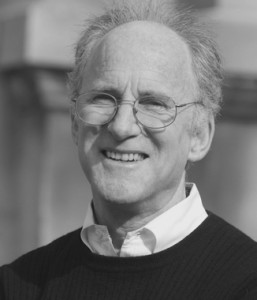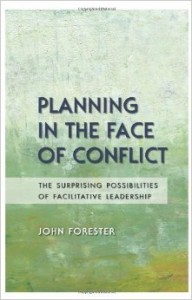Journal of the American Planning Association (1987), John Forester
About the author:
One theoretician who has directly meet the conflictual nature of planning and has involved himself in mediating planning conflicts is Cornel planing professor John Forester.
He is a professor of city and regional planning at Cornell University, and he is interested in the ways planners shape participatory processes and manage public disputes in divers setting, planning ethics, and mediation.
Foster got down in the trenches with practicing planners and other stakeholders involved in urban planning decisions to study what the practice of city planning in really like in the face of conflict. He has been involved in mediating planning conflicts in the area where he lives.
He learned from his practical experience mediating conflicts. Forester did not just write about conflict as an aspect of postmodern culture like David Harvey or throw his hands in the face of conflict like Mike Davis. Forester’s work synthesises what he learned and develops theoretical concepts that are highly relevant to planning practice.
There is another important article by Forester on how urban planners manage conflict is “Planning in the Face of Power,” which appeared in the Journal of the American Planning Association, (1982).
Summary of the article:
The following selection summaries what he learned about the planning process and his ideas on how planners can be effective in the face of conflict.
There are 6 ways to mediate local land-use conflicts:
1-The fact, the rules ( The planner as regulator)
2-Pre-mediate and negotiate representing concerns
3-Let them meet the planner as resource
4-Perform shuttle diplomacy-probe and advise both sides
5-Active and interested mediation-thriving as a non-neutral
6-Split the job: you mediate, I’ll negotiate
TO CONCLUDE: There are many lessons in forester’s work. People who want to be effective translating city plans into action next to expect opposition and should not be surprised or worn down by what often seems as endless and frustrating process.
Successful planners should be:
1-They have to be attentive to timing.
2-They must respond to complex duties.
3-They must be true to professional norms and hold fast to their own visions of high-quality city development.
4-They need to be aware of their own power and also its limitations.
5-They have to be sensitive to and understand the interests of the many different actors in the city development process.
The repertoire of mediated-negotiation strategies inevitably requires that planners exercise practical judgment, both politically and ethically. These judgments involve who is and who is not inited to meetings; where, when and which meetings are held; what issues should and should not appear on agendas; whose concerns are and are not acknowledged; how interventionists the planner’s role is; and so on.
In local planning processes, then, planners often have administrative discretion not only to mediate among conflicting parties, but to negotiate as interested parties themselves. Planning staff can routinely engage in the complimentary tasks of supporting organizing efforts, negotiating, and mediating. In these ways, local planner can use a range of mediated-negotiation strategies to address practically existing power imbalances of access, information, class, and expertise that perpetually threaten the quality of local planning outcomes.
Mediated negotiations in local permitting processes will, of course, not resolve the structural problems, of our society. Yet when local conflicts involve multiple issues, when differences in interests can be exploits by trading to achieve joint gains, and when diverse interests rather than fundamental rights are at stake, mediated-negotiation strategies for planners make good sense, politically, ethically, and practically.
How its relevant to Doha ?
Qatar must choose a development and an urban planning path that is compatible with the targeted vision in the future. Qatar is currently experiencing high rates of population growth due mainly to massive urban development, large-scale investment projects and rising government, so Qatar have to have successful planners as well.
Published by: Noura Al-Mansouri



